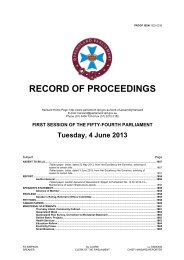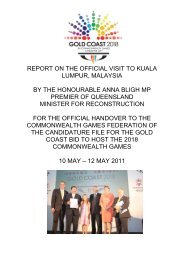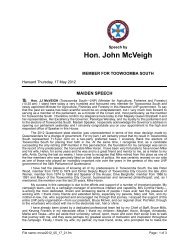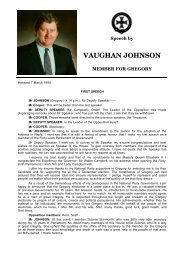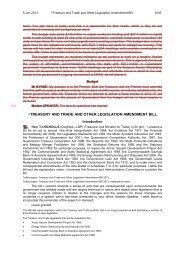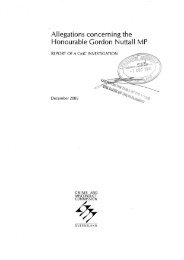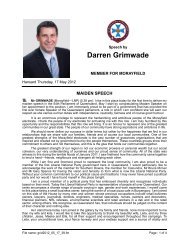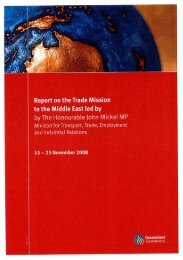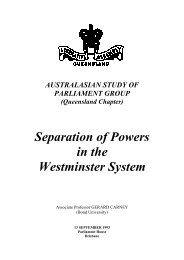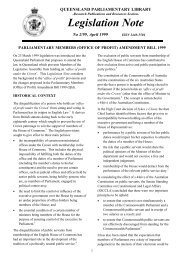weekly hansard - Queensland Parliament - Queensland Government
weekly hansard - Queensland Parliament - Queensland Government
weekly hansard - Queensland Parliament - Queensland Government
Create successful ePaper yourself
Turn your PDF publications into a flip-book with our unique Google optimized e-Paper software.
2626 Plumbing and Drainage and Other Legislation Amendment Bill 23 Aug 2005<br />
affluence. So there was an enormous generational change in a short period. To have to save things, to<br />
have to protect resources, almost made it seem as if a person was poor. Not all people changed in that<br />
way—I am not putting down a whole generation—but in just one generation we reached a point where<br />
waste came to be seen virtually as a sign of affluence.<br />
Now, by my generation, we are very much changing back the other way. We have become<br />
conscious that the resources we have such as oil, water and forms of energy are very much finite and<br />
very much need to be protected. I think we can watch the legislative path alongside those generational<br />
changes. It was in the generation before this one that we did what now seems a bizarre thing to do; that<br />
is, legislate to specifically prevent people using grey water from their washing or from their showers—or<br />
wherever it might have been from—on their gardens. We now need to go very much the other way.<br />
We now need to recognise that huge aspects of the life that we lead are fundamentally<br />
unsustainable. We use more oil than the next generation will begin to imagine using. We use more<br />
electricity than the next generation will begin to imagine is possible. We use more water than the next<br />
generation will even dream of. So these changes—the Sustainable Housing Policy and the use of grey<br />
water—are very much the first steps in what will be a serious and long journey down the path of<br />
sustainability in our households.<br />
I urge the government to consider these initiatives as first tentative steps down that path. Indeed,<br />
we need to go much, much further, because the way we use water now is simply unsustainable. We<br />
have just released the South East <strong>Queensland</strong> Regional Plan for a population that will be far greater<br />
than the population we have now. We all need to understand that when south-east <strong>Queensland</strong>’s<br />
population doubles, if we are still using the amount of water that we use now we simply will not have<br />
enough water.<br />
Some people think that we will build new dams. Building new dams will not create more water in<br />
south-east <strong>Queensland</strong>. Then some people turn to the idea of desalination, but desalination is<br />
enormously energy intensive. There is only one way to make sure that we have enough water for the<br />
population that south-east <strong>Queensland</strong> will have in the future and that is not to create more water<br />
somehow, not to dam more water and not desalination; it is simply to use far less water.<br />
I am hugely supportive of these steps that the government is taking, but I think we have to<br />
understand that these are teeny steps just at the beginning. I urge the government to keep in mind and<br />
start talking to the community about the fact that we are going to have to go further. We are seriously<br />
going to have to look at mandated water use targets for most households. I urge the government to<br />
keep in mind the possibility of mandating rainwater tanks for all households, because I simply think we<br />
are going to have to go there. With those few words, I commend the bill to the House.<br />
Hon. D BOYLE (Cairns—ALP) (Minister for Environment, Local <strong>Government</strong>, Planning and<br />
Women) (7.50 pm), in reply: I thank all honourable members who have participated in the debate on the<br />
Plumbing and Drainage and Other Legislation Amendment Bill 2005. Since 2001, many communities<br />
across <strong>Queensland</strong> have been living with drought, and water resources have been scarce in coastal<br />
centres as well as rural and remote regions. The current drought is particularly harsh and nationally<br />
widespread, but history tells us that drought is not an exceptional event in Australia; rather it is a natural<br />
and recurring phenomenon, and a major drought can be expected in Australia on average every 20<br />
years. <strong>Queensland</strong>’s climate history tells the same story. We live in an environment where water is a<br />
scarce and precious commodity, with fast-growing regions putting additional pressure on water<br />
resources. It is important, therefore, that <strong>Queensland</strong> takes action now to promote water conservation<br />
and to create a legislative environment that allows the safe reuse and recycling of water.<br />
The main objective of this bill is to allow for greater use of grey water by <strong>Queensland</strong> home<br />
owners. The amendments in the bill provide for the use of grey water in urban areas to irrigate lawns<br />
and gardens. Grey water use in sewered areas was not allowed in the past due to concerns about<br />
impacts on public health and the environment. This bill amends <strong>Queensland</strong>’s plumbing and drainage<br />
legislation so that local governments can now approve grey water use facilities in sewered areas, with a<br />
number of sensible constraints that will address these concerns. All grey water systems will require<br />
council approval, and councils will be able to refuse approval for premises where land is considered<br />
unsuitable for grey water irrigation. Also, individual councils will be able to decide whether or not they<br />
wish to receive applications for grey water systems. Some councils may decide that resources are best<br />
used to investigate other options for water conservation and reuse, such as water recycling schemes.<br />
In addition to grey water legislation, the bill includes amendments to make the approval process<br />
for on-site sewerage work consistent with approval processes for other plumbing and drainage work.<br />
On-site sewerage work was treated differently when it was first incorporated into the PDA because it<br />
had been administered under different legislation. The amendments in the bill will improve integration<br />
and ensure that the same accountability standards apply to all work.<br />
The Scrutiny of Legislation Committee considers that the bill raises two issues within the<br />
committee’s terms of reference. Firstly, the committee notes that the bill confers on investigators certain<br />
powers of entry which extend beyond situations where the occupier consents or where a warrant has<br />
been obtained and draws parliament’s attention to these entry powers. The powers of entry provisions in



